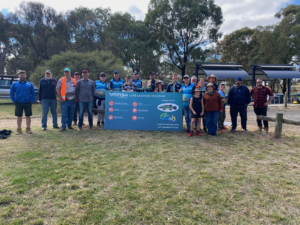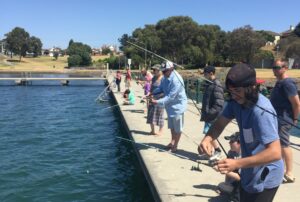Game Fishing
We have a great array of game fishing species in our waters such as mako sharks, thresher sharks, kingfish, Southern bluefin tuna and albacore. Recent captures of broadbill swordfish off Lakes Entrance and Mallacoota shows the opportunity to grow the sector even further. Future climate change predictions will see better game fishing opportunities in Victoria and Tasmania as the South East Australian current pushes warmer water and tropical species further south, for longer.
Our fisheries are regulated and closely monitored. There are also codes of practice in place for species such as Southern bluefin tuna. Anglers have played a significant role in tagging fish and collecting data to ensure we have sustainable fisheries. VRFish along with the Game Fishing Association of Victoria is passionate about protecting our fishing opportunities now and into the future.
VRFish supports the Game Fishing Australia’s (GFAA) Code of Practice for Gamefishing in Australia and encourages Victorian Anglers to:
- Fish to the ethical standards espoused by the GFAA. Follow the rules and regulations set by the GFAA. Always conduct gamefishing activities in an ethical manner.
- Show due care and responsibility for the habitat of gamefish and other marine life. Don’t discard anything overboard, including plastic, metal and fishing line. Report pollution. Pick up floating rubbish. Take care in anchoring over sensitive reef areas. Only use biodegradable chemicals onboard.
- Minimise direct effects on wildlife, including seabirds, marine mammals and reptiles.
- Minimise taking onboard material that will produce pollution or rubbish. Observe proper provisioning processes. Minimise packaging.
- Follow all relevant regulations by governing institutions. Adhere to bag and size limits. Respect and adhere to protected species legislation. Be aware of zoning within marine parks and marine protected areas.
- Be informed about the biology of gamefish. For example, be aware of how to identify various gamefish species for more accurate recording of tagging and capture data.
- Tag and release fish with care. Learn the correct procedures for tag and release and catch and release to ensure maximum likelihood of survival of tagged and eleased fish. Record and forward accurate post-release information in a timely manner.
- Take only what is needed. Exercise restraint when taking any species of fish even if no bag limits exist. Be realistic about the amount of baitfish taken for fishing. Try to return unused live baitfish to the area in which they were caught.
- Dispatch fish quickly and humanely. All fish that are taken should be killed as quickly and humanely as possible.
- Convey the benefits of gamefishing to the public. Take opportunities to educate the non-fishing public about the benefits of gamefishing, of tag and release and support of research.
- Encourage others to join affiliated gamefishing clubs.
- Cooperate and participate in research and development activities that will enhance the sustainability of the resource. Offer free access to fish for recognised research programs. Participate in biological sampling programs.
- Participate and assist in the collection of catch and effort statistics.
- Consider and respect the rights of others when engaged in any aspect of gamefishing. This includes other anglers, and commercial fishers’ rights to harvest common property resources.
For further information about Game Fishing in Victoria contact the Game Fishing Association of Victoria. They are affiliated with the Game Fishing Association of Australia (GFAA) and the International Game Fishing Association (IGFA). There are currently 16 Clubs Affiliated with GFAV and they represent approximately 700 Game Fishers.




